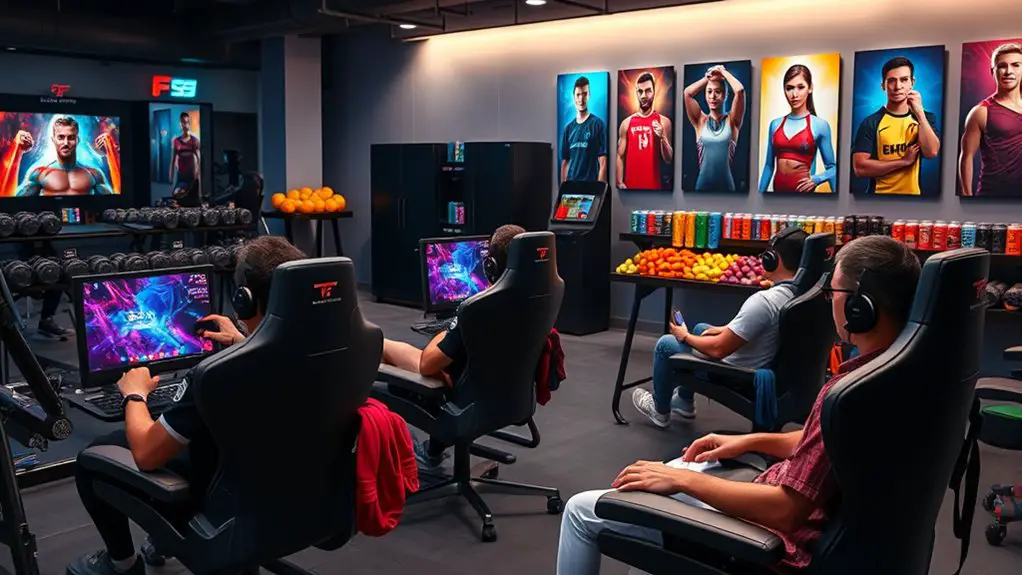To set realistic sports goals, start by evaluating your current skill level and tracking your performance. Define a long-term vision that aligns with your values and break it into short-term objectives using the SMART criteria. Make sure your goals are specific, measurable, achievable, relevant, and time-bound. Regularly track your progress and adjust as necessary, celebrating small wins to stay motivated. Stick around to discover more strategies for successful goal attainment in your athletic journey.
Understand Your Current Skill Level
To set realistic sports goals, you first need to gauge where you currently stand in your athletic journey. Take some time to assess your skills honestly—think about your strengths and areas for improvement. Maybe you've got a solid base in endurance but struggle with agility. Don't shy away from seeking feedback from coaches or peers; their insights can be invaluable. Track your performance in various activities, and consider keeping a journal to document your progress. Remember, understanding your current skill level isn't about limiting yourself; it's about freeing you to grow. This self-awareness will empower you to set goals that truly resonate with your aspirations and capabilities, leading to a more fulfilling and exciting athletic experience.
Define Your Long-Term Vision
Once you've assessed your current skill level, it's time to think about where you want to go in your athletic journey. Defining your long-term vision gives you a sense of direction and fuels your motivation. Consider what you truly desire in your sport—whether it's competing at a high level, enjoying the process, or simply staying fit.
Here's a simple way to map out your vision:
| Goal Type | Your Aspirations | Timeline |
|---|---|---|
| Performance | ||
| Enjoyment | ||
| Fitness | ||
| Community | ||
| Mastery |
Identifying these elements helps you stay focused on what truly matters to you, paving the way for your ultimate success.
Break Goals Down Into Short-Term Objectives
Breaking your long-term vision into short-term objectives can make your goals feel more attainable and less overwhelming. Start by identifying key milestones that lead to your ultimate goal. These bite-sized tasks can help you focus and stay motivated. For instance, if your long-term goal is to run a marathon, set weekly distance targets or time-based workouts. Celebrate these smaller victories; they'll fuel your passion and keep you energized. You'll find that each short-term objective brings you closer to the freedom you seek in your athletic journey. Remember, it's not just about the end goal but enjoying the process along the way. Stay flexible and adjust as needed, allowing yourself the freedom to grow and evolve in your pursuits.
Use the SMART Criteria for Goal Setting
When setting sports goals, utilizing the SMART criteria can greatly enhance your chances of success. SMART stands for Specific, Measurable, Achievable, Relevant, and Time-bound. Start by defining what you want clearly; vagueness won't get you far. Make certain your goals are measurable, so you can track your progress. They need to be achievable too—setting the bar too high might lead to frustration. Verify your goals are relevant to your overall aspirations and lifestyle, aligning with what you truly want. Finally, set a deadline to keep yourself accountable; without a timeline, it's easy to drift. By applying the SMART criteria, you create a solid foundation for your sports goals, giving you the freedom to pursue what you genuinely love.
Track Your Progress and Adjust as Needed
As you work toward your sports goals, tracking your progress is essential, since it allows you to see what's working and what isn't. Regularly evaluating your performance gives you the freedom to adjust your strategies as needed.
Here's a simple way to track your progress:
| Date | Achievement |
|---|---|
| Week 1 | Completed 3 workouts |
| Week 2 | Increased endurance |
| Week 3 | Improved technique |
Use this table to reflect on your achievements and identify areas for improvement. If something isn't working, don't hesitate to switch things up. Being flexible with your approach empowers you to stay on course and reach your goals while enjoying the journey.
Stay Motivated and Celebrate Small Wins
Staying motivated can be challenging, especially during tough training sessions or when progress seems slow. To keep your spirits high, focus on celebrating small wins along the way. Recognizing these victories can reignite your passion for the sport and remind you of your journey.
Staying motivated during tough training is key; celebrate small wins to reignite your passion and reflect on your journey.
- Track mini-goals, like mastering a new technique or improving your stamina.
- Share your achievements with friends or teammates to create a supportive environment.
- Treat yourself to something special after reaching a milestone, no matter how small.
These practices not only boost your motivation but also reinforce your commitment to your goals. Embrace the freedom that comes with each step forward, and remember: every small win is a significant part of your bigger journey.
Frequently Asked Questions
How Can I Involve a Coach in My Goal-Setting Process?
Involving a coach in your goal-setting process can be a game-changer. You can share your aspirations, seek their insights, and collaborate on strategies, ensuring your goals are realistic and aligned with your unique vision.
What if I Face Setbacks While Pursuing My Sports Goals?
So, you're thinking setbacks are the end, huh? Ironically, they're just plot twists in your sports story. Embrace them, learn, adapt, and keep pushing. Freedom's in the journey, not just the finish line.
How Do I Balance Multiple Sports Goals Simultaneously?
Balancing multiple sports goals can be tricky, but you can prioritize based on your passion and energy levels. Don't forget to stay flexible, adjust as needed, and celebrate small wins along the way.
Can I Set Goals for Non-Competitive Sports Activities?
Absolutely, you can set goals for non-competitive sports activities! It's all about personal growth and enjoyment. Focus on what excites you, whether it's improving your skills, staying fit, or just having fun with friends.
What Role Does Nutrition Play in Achieving Sports Goals?
Nutrition's essential for reaching your sports goals. It fuels your body, aids recovery, and enhances performance. By choosing the right foods, you'll feel energized and ready to conquer whatever challenges come your way.




